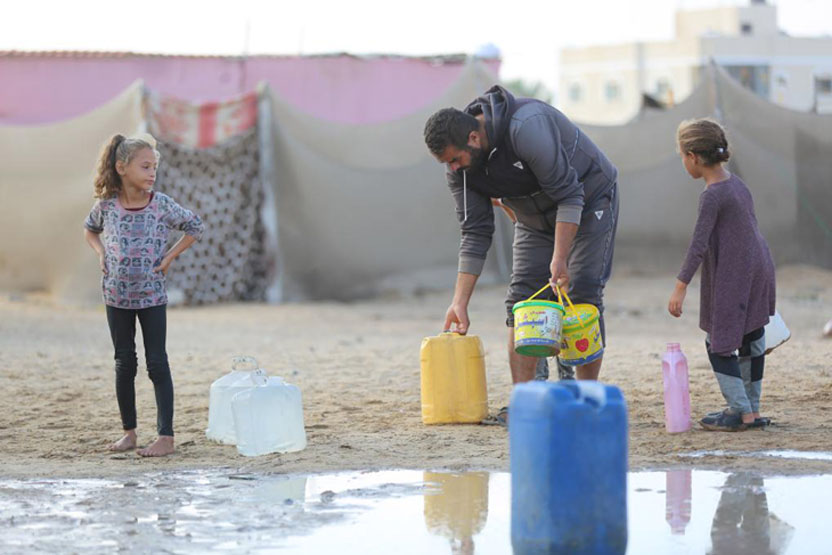
published on Arabi21
By Hussein Mostafa
Reviewed and edited by TiredEarth
Israeli occupation forces have destroyed sewage networks, main water pumping stations, and wastewater treatment plants across the Gaza Strip, along with municipal waste collection equipment.
Havinzg left no means unused to target civilians in the besieged territory, the occupation army has turned public and personal hygiene into a battlefield. By fully controlling border crossings and imposing a strict blockade, it has weaponized the deprivation of basic sanitation against the population.
Hygiene as a Weapon of War
The destruction of basic infrastructure and municipal equipment has led to mountains of garbage accumulating in the streets, while sewage leaks into displaced-person camps and dilapidated tents. On top of that, essential hygiene supplies—soap, disinfectants, and clothing—have been blocked, worsening an already catastrophic situation.
The Euro-Mediterranean Human Rights Monitor has stated that Israel’s continued arbitrary blockade, and its prevention of essential aid including hygiene and cleaning supplies, amid the spread of infectious diseases and extremely difficult living conditions for roughly 2.3 million Palestinians, constitutes a form of comprehensive genocide.
Destroyed Infrastructure
Occupation forces have targeted and destroyed sewage networks, pumping stations, and wastewater treatment plants. Untreated sewage now flows into the streets or directly into the sea, turning Gaza’s coastline into an open sewer. Beaches have become polluted and hazardous.
Garbage collection trucks, municipal dumps, and solid waste management centers have also been destroyed, leaving municipalities unable to maintain even the most basic sanitation services.
Epidemics and Disease
With streets clogged with waste and sewage stagnating, epidemics are spreading. Skin diseases—caused by poor hygiene and contact with insects breeding in garbage—are on the rise, as are bacterial and fungal infections. Contamination of groundwater by sewage has led to diarrheal diseases and even suspected cases of cholera.
Open-air burning of garbage, due to the absence of proper dumps, has further polluted the air, causing an increase in respiratory infections, particularly among children and the elderly.
“Gaza Is Living Its Hardest Days”
In an interview with Arabi21, Assem al-Nabih, spokesperson for the Gaza Municipality, described the situation as “Gaza’s most difficult days since the start of the aggression.” According to him, famine, bombings, and the collapse of the health system are not the only disasters—the complete breakdown of municipal services now threatens daily survival.
He warned of a potential “total collapse” of municipal services, including water supply, sewage, and waste collection. Already, over 250,000 tons of garbage are piled across Gaza, representing a major environmental and health crisis.
According to al-Nabih:
-
Over 75% of Gaza’s water wells are destroyed;
-
More than 120 kilometers of water pipelines have been annihilated;
-
100% of sewage stations and pumps are partially or completely destroyed;
-
More than 200 kilometers of sewage networks have been damaged;
-
Over 85% of municipal heavy and medium machinery has been destroyed.
He added that municipal teams have been working under extreme conditions since the beginning of the war, with minimal resources and a total lack of equipment, fuel, and materials needed for maintenance.
“We have repeatedly called for the entry of repair materials, heavy machinery, and sufficient fuel to provide at least minimal services,” he stressed, noting that citizens have been living under inhumane conditions for more than 700 consecutive days.


Comment
Reply